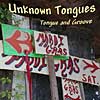Accidental Productions AP002
 Bryan Blake: vocals, accordion, fiddle, pedal steel, electric guitar; Barbara Blake: vocals, guitar, triangle, rubboard; Tom Parker: drums, cricket chirp; Todd Humphreys: bass, backup vocals; with Matt Haney: fiddle; Margie Misenheimer: backup vocals, rubboard, triangle.
Bryan Blake: vocals, accordion, fiddle, pedal steel, electric guitar; Barbara Blake: vocals, guitar, triangle, rubboard; Tom Parker: drums, cricket chirp; Todd Humphreys: bass, backup vocals; with Matt Haney: fiddle; Margie Misenheimer: backup vocals, rubboard, triangle.
Tongue and Groove/Mon Neg’ est Pas ‘Rive/Cherokee Waltz/Sugar Bee/Madagascar/Doghill/(J’ai Fait Une)Grosse Erreur/High Point 2-Step/Ya-Ya/Thirteen Miles to Merrimon/Fish Factory/Zydeco Queen/Love Bridge Waltz/Iko Iko.
If you go to Clifftop or Mt. Airy then you have seen or at least heard Bryan and Barbara Blake and their outrageous inappropriate kickass wailing joyous band, Unknown Tongues. Yes, they are the folks in the gypsy wagon with the huge yellow tarp covering the whole thing and the bottomless cauldron of incredible gumbo always with one more bowl at 3 AM, even if it’s a cold rainy Saturday night. Yes, they enter the band contest and get on stage with an accordion and a rubboard and some fiddles and guitars and a triangle and a second accordion and maybe even a @#!drum#!?! Oh how could they, and the judges shake their poor heads or grin and the crowd just loves them, and they get their $10 back and go back to the gumbo and fun. You know who they are. So they’ve made this really good CD now.
The CD is a mixture of what they do when they are playing gigs—some traditional cajun songs like “High Point” and “Cherokee Waltz,” some zydeco from the region of Boozoo and John Delafois, like “Zydeco Queen” and “Doghill,” a few original songs from Barbara’s pen: “Tongue and Groove” (co-written by my wife, Libby), “Madagascar”—a story about double-wides, NASCAR, and a naïve Madagascar lad who comes back to the states with his anthropologist apologist only to disappear into the bowels of Atlanta. They also include, in the way of zydeco, “Iko Iko” and “Ya Ya.”
I have to say right out that Libby and I played in Unknown Tongues for seven years. It was one of the high points of my musical life too. But as we don’t have anything at all to do with this recording and have been uninvolved in Tongues’ doings for a couple of years—Libby was completely surprised by the title cut and, well, royalties???? You must be kidding, right? Nonetheless, this is a terrific recording. Bryan’s accordion-playing and singing, together with Tom Parker’s great drumming, anchors the CD just as he does when they’re live at the Back Street in Beaufort. They get great guest work from Matt Haney on fiddle. He really spices up the cajun side with great traditional licks and turns and that sets Bryan up for the raunchy zydeco sawing he revels in. Barbara Blake is her usual songbird self on her vocals, ably backed up by Margie Misenheimer on some occasions. Bryan also contributes some fine pedal steel work. The steel is not always connected with Louisiana music, but just remember D.L. Maynard’s sound and you’ll place it fine. Todd Humphreys rocks the bass end on numbers like the double-clutched “Dog Hill.” The band also tosses in a couple of songs that are more regional to them than anything else: “Thirteen Miles to Merrimon” is a kind of blues written by Carteret County singer/songwriter Connie Mason; “Fish Factory,” a Blake & Blake composition, commemorates the menhaden factories of Beaufort.
My favorite cut on the whole CD might be “Grosse Erreur,” which captures the real dance hall sound you would find down in those little towns that run along US 90 between Lafayette and Lake Charles. It is not possible to do this stuff from a careful distance. Pick up one of these before they’re gone, and if you’re in the neighborhood, head down to the Gloucester Mardi Gras the Blakes throw for the community every February.
To Order:
Bryan Blake
PO Box 91
Gloucester, NC 28528
(252)729-8021
blake@unknowntongues.com
Unknown Tongues Website
–Bill Hicks
Published in the Old Time Herald in 2004
